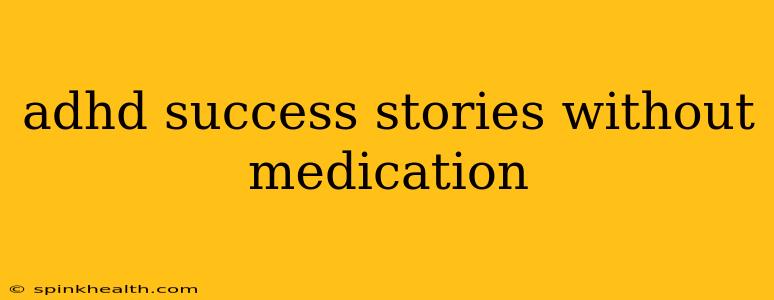The journey of navigating ADHD is unique to each individual. While medication plays a significant role for many, countless others have found success managing their ADHD symptoms without relying on pharmaceuticals. This isn't about rejecting medication; it's about highlighting the diverse paths to thriving with ADHD. This article shares inspiring stories of individuals who've harnessed their strengths and developed coping mechanisms to achieve remarkable things, all without medication.
What Strategies Helped These Individuals Succeed?
Let's delve into the strategies that have helped people successfully manage their ADHD without medication. These are not one-size-fits-all solutions, but rather a collection of techniques that have proven effective for many. The common thread is a proactive and often highly individualized approach.
Understanding and Accepting ADHD: The First Step
Many success stories begin with self-acceptance and a deep understanding of their ADHD. Sarah, a successful entrepreneur, explains: "For years, I beat myself up for my 'flaws.' Once I accepted ADHD as a part of me, not a deficit, I could start working with it, not against it." This self-awareness is paramount; it allows individuals to identify their strengths and weaknesses and tailor strategies accordingly.
Developing Effective Organizational Systems
Many people with ADHD benefit from structured environments. This isn't about rigid adherence to rules, but about creating systems that support their unique needs. John, a software engineer, shares, "I use color-coded calendars, task management apps, and even a whiteboard to visually track my progress. Seeing tasks completed provides a sense of accomplishment and motivates me to continue." Finding the right system, whether it's digital or analog, is crucial for managing tasks and deadlines.
Harnessing the Power of Routine and Habits
Routines can provide much-needed structure and predictability for those with ADHD. This doesn't mean a rigid, unyielding schedule, but establishing consistent habits for daily tasks, like waking up at the same time, planning meals, or having a dedicated workspace. Maria, a freelance writer, credits her morning routine with maintaining her productivity: "A consistent morning routine – exercise, meditation, and a healthy breakfast – sets the tone for a productive day. It allows me to focus on writing when it's time to write."
Utilizing Time Management Techniques
Time management isn't about cramming more into a day; it's about prioritizing and working smarter, not harder. Techniques like the Pomodoro Technique (working in focused bursts with short breaks), time blocking, and Eisenhower Matrix (prioritizing tasks based on urgency and importance) can significantly improve productivity and reduce overwhelm. David, a teacher, implemented the Pomodoro Technique and says, "The structured breaks prevented burnout and helped me stay focused throughout the day. I found that short, frequent breaks were far more effective than trying to push through without rest."
Embracing Mindfulness and Meditation
Mindfulness and meditation can help individuals develop self-awareness, manage impulsivity, and improve focus. These practices encourage present moment awareness, helping to reduce racing thoughts and emotional reactivity, hallmarks of ADHD. Emily, a graphic designer, found meditation incredibly helpful: "Meditation taught me to observe my thoughts and feelings without judgment. It’s helped me become more self-aware and manage impulsive behaviors more effectively."
Seeking Support and Building Community
Having a supportive network is invaluable. This could be family, friends, a therapist, or a support group. Sharing experiences and connecting with others who understand can reduce feelings of isolation and provide practical advice. Connecting with others facing similar challenges creates a sense of belonging and shared understanding that is crucial to long-term success.
Common Questions About ADHD and Medication-Free Success
This section addresses common questions surrounding ADHD and successful management without medication.
Is it possible to succeed with ADHD without medication?
Absolutely! Many individuals thrive with ADHD without medication, utilizing various strategies and coping mechanisms tailored to their individual needs. Success is defined differently for everyone, so focusing on personal goals and achievements is key.
What are the limitations of not using medication for ADHD?
While many find success without medication, it's important to acknowledge that managing ADHD without medication can be more challenging for some individuals. The severity of symptoms and individual responses to different strategies play a crucial role. It's crucial to consult with a healthcare professional to assess individual needs.
What are the long-term effects of managing ADHD without medication?
Long-term success hinges on consistent effort, self-awareness, and the willingness to adapt strategies as needed. The journey may require experimentation to find the most effective combination of techniques. Regular check-ins with a therapist or coach can provide valuable support and guidance.
What resources are available for people with ADHD who choose not to use medication?
Numerous resources exist, including books, online communities, and therapists specializing in ADHD. These provide information, support, and guidance for developing effective coping strategies. It's essential to find resources that resonate with individual needs and preferences.
Remember, the journey to managing ADHD without medication is a personal one. The stories above showcase the power of self-awareness, strategic planning, and consistent effort. The key is to find what works best for you and to celebrate every step of the way.

